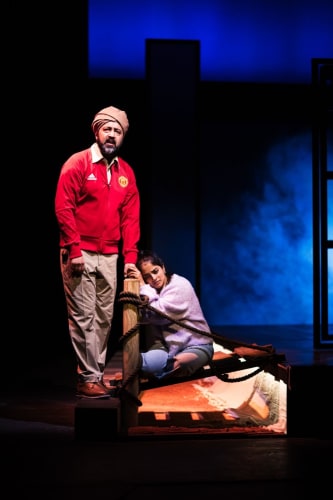Silence has had a long journey to the stage. It started as a 2017 BBC Radio 4 documentary on Indian Partition made by the journalist, Kavita Puri (still available online on BBC Sounds). She then wrote it up into a 2019 book, Partition Voices: Untold British Voices, and in 2022, the director of Tara Theatre, Abdul Shayek, directed it for the stage at The Donmar Warehouse in London. This new 2024 touring production is directed by Iqbal Khan, an associate director at The Birmingham Rep.
The play is based on interviews with people who lived through the 1947 Indian Partition when British rule ended and the subcontinent was divided into three separate sovereign states: India, under principally Hindu rule, and West and East Pakistan (now Pakistan and Bangladesh), which were majority Muslim. Partition resulted in the largest peacetime migration ever seen, as over twelve million people were forced to relocate in a matter of months and at least a million died.
Kavita Puri is a third generation British Asian and her grandfather lived through Partition. He was a Hindu living in Lahore, which became part of Muslim Pakistan, so he and his family fled. Those who escaped to Britain had no desire to relive their experience, so they kept silent about it to their own families, and it is a blot on British colonial history, so there is little mention of it in the history books either. Silence aims to break the silence that surrounds Partition and record the experience of its victims and survivors while they are still alive to tell their stories.
We hear about the shame of an Indian soldier who fought for the British against his own people, lovers forced to separate and childhood friends who never saw each other again. Some families were betrayed by their neighbours, while others were saved by theirs. Running through it all is the sheer incomprehension at why any of this had to happen at all.
A cast of six play a selection of Puri’s interviewees and present their testimony, sometimes in character as the children they were at the time, sometimes in the form of direct address to the audience and in some cases the interview with Puri is re-enacted with video cameras projecting their faces onto the back of the set.
As a piece of theatre, Silence is strikingly beautiful. The set consists of several chairs, stacked at the start in an approximation to the shape of India, and some door frames on wheels. There are screens at the back of the stage onto which a series of still images, animations and live, on-stage video streams are projected. Seeta Patel’s choreography is subtle and understated, the video design by Rachana Jadhav and Simeon Miller complements the action and Beth Duke’s sound design is perfectly integrated into the live action and projection.
I felt, at times, that the aesthetic experience was at risk of obstructing, rather than illuminating, the interviewees’ words. The characters’ first names are listed in the programme, but they are rarely mentioned on stage, so the play loses the specificity of the radio documentary and the book. The programme credits four writers, none of whom are Kavita Puri, so the lack of character identification on stage, the many playwriting credits and a framing device of a fictionalised version of Kavita Puri called Zara (Tia Dutt) and her fictional fiancé, Sami (Aaron Gill) meant it was unclear at any given time whether what was being said on stage was a verbatim rendition of the original survivors’ interviews or a fictionalised, dramatised version of them. For a project originally intended to document the lived experience of its subjects, I found this frustrating.
That aside, some sections of the play are superb, particularly in the second half. Asif Khan delivers an electrifying half-hour monologue as a young Sikh boy who is separated from his Muslim friend, Saleem. That is followed by a quiet, and deeply moving, monologue by Bhasker Patel as an old man dredging up long-buried memories from the past.
I am aware that the story of Indian Partition is not mine to tell. Silence has been made by people of South Asian heritage for whom the legacy of Empire is part of their identity so, while I felt that the beauty of the production was, at times, at odds with its harrowing content, maybe creating beauty out of horror is the point.
